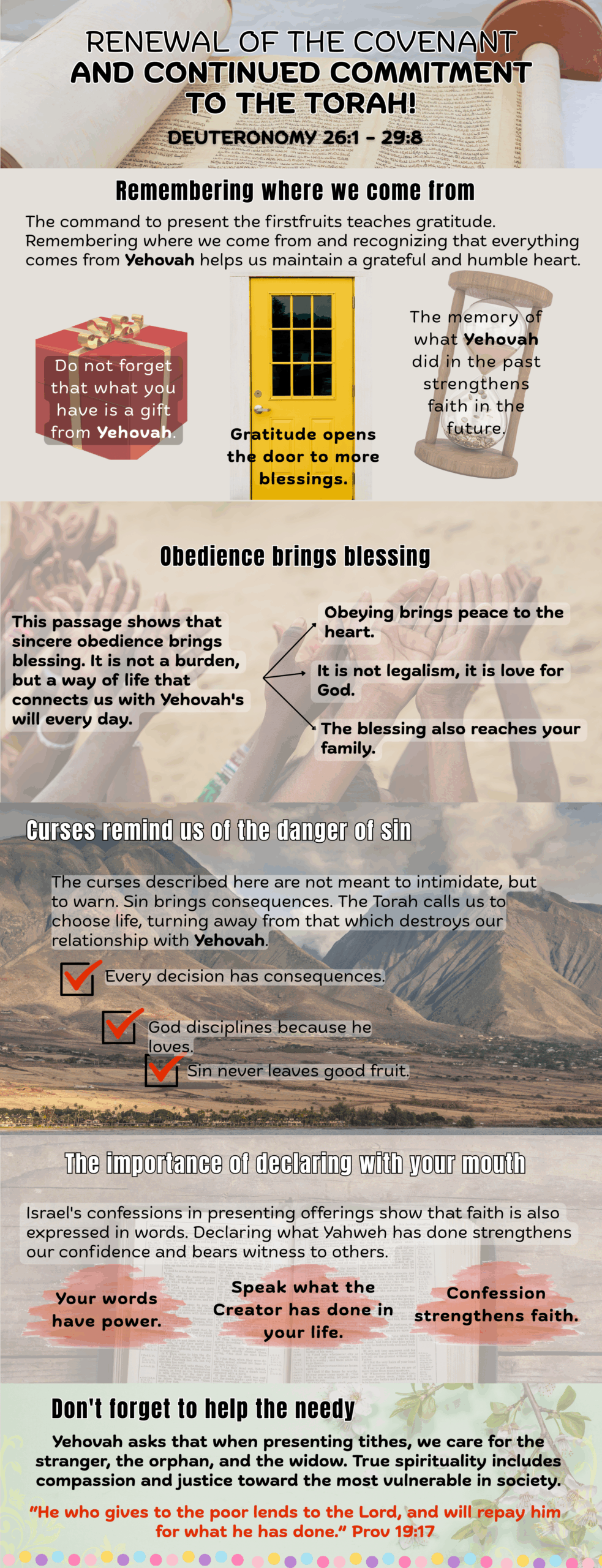Parashah Ki Tavo
Deuteronomio 26:1 – 29:8
The portion of Ki Tavo marks a pivotal moment in Israel’s journey. After leaving Egypt and crossing the wilderness, the children of Israel now stand at the threshold of the Promised Land, soon to enter under the leadership of Joshua. Through Moses, Yehovah gives them detailed instructions for when they set foot in that land. The first act He commands is the offering of the firstfruits—a gesture of thanksgiving to acknowledge that every harvest, every blessing, and the very land itself are gifts from the Almighty. It was a reminder that their success was not the work of their own hands, but the goodness and faithfulness of Yehovah.
Moses also lays out a sober contrast: abundant blessings for obedience and severe curses for rebellion. The blessings would bring prosperity, security, and joy; the curses would bring loss, suffering, and even exile. This is not merely history—it is a timeless call to every heart.
Ki Tavo teaches us that obedience is not a burden but a path to life, and gratitude is not optional but essential. Our choices matter. When we walk in Yehovah’s ways, aligning with His Torah, we open our lives to His favor. But when we turn away, we step into the painful consequences of disobedience.
This portion is an invitation: to live in constant awareness of Yehovah’s goodness, to offer Him the “firstfruits” of our lives—our time, our devotion, our resources—and to trust that His blessings follow those who walk in His ways.

At the close of this portion, Moses reminds the people of all the wonders Yehovah has done for them—from their deliverance out of Egypt to their sustenance in the wilderness. He recounts how they witnessed mighty signs: the plagues, the crossing of the Red Sea, and the manna that fell from heaven each day to feed them. Yet, Moses points out that even after experiencing all these miracles, their hearts had not yet been fully transformed. Only now, after years of journeying and testing, are they beginning to grasp the depth and weight of the covenant they have entered into with their Creator—realizing that it is not merely about keeping commandments, but about cultivating a deeper, conscious relationship with Yehovah.
It is at this very moment—just before they step into the Promised Land—that a crucial call is made for spiritual renewal and ongoing commitment to the Torah. The covenant is not a one-time event of the past but a living and continuous reality that calls for constant reflection and action. As Israel stands on the threshold of a new chapter in their history, they are to enter the land not only with free bodies, but with hearts that fully understand and embrace the Father’s purpose for their lives.
Questions for Reflection and Prayer:
How might it be that we, too, can see Yehovah’s wonders in our lives yet still have hearts slow to trust and obey? Where might He be calling us to deeper understanding today?
What does renewing your commitment to Yehovah look like in this season of your life? Is there a specific step of obedience, repentance, or gratitude He is asking of you?
How can you offer Him not just outward observance, but a heart fully surrendered to His will?
As you “stand on the threshold” of your own new chapters—decisions, challenges, opportunities—how can you enter them with a spirit that embraces Yehovah’s purposes fully?